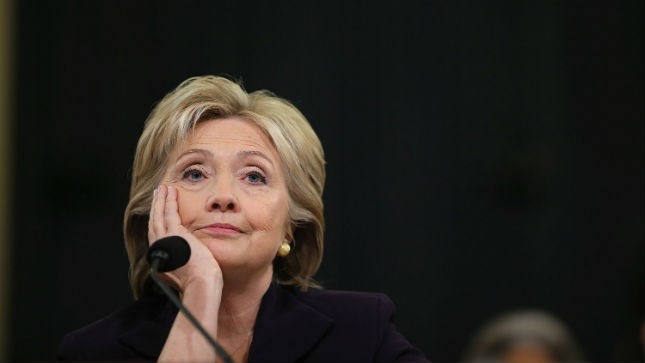
Hillary Clinton emerged largely unscathed from a marathon day of testimony to the House Select Committee on Benghazi on Thursday.
The appearance was seen as a crucial moment for the former secretary of State, and the Republican panel lobbed dozens of questions at her about her personal email setup, her longtime associate Sidney Blumenthal, and Chris Stevens, the U.S. ambassador to Libya killed in the 2012 terrorist attacks in Benghazi.
But none of the lawmakers' critiques throughout the course of the long day seemed to stick.
"I don't know that she testified that much different today than she has in the past," Chairman Trey Gowdy (R-S.C.) conceded as the hearing wrapped up.
If anything, the only serious political damage seemed to have been done to GOP leaders of the panel, who were repeatedly put on defense by harsh barbs from committee’s Democrats.
“We’re better than using taxpayer dollars to try and destroy a campaign,” Rep. Elijah Cummings (Md.), the committee's top Democrat, said as the 11-hour hearing was entering its final moments, it was part of a rousing speech that was cheered in the committee room. “That’s not what America is all about.”
The stakes were high for both sides coming into Thursday.
Clinton, a Democratic presidential candidate, needed to escape undamaged without losing her calm about the Sept. 11, 2012, attacks that killed four Americans.
Gowdy and fellow committee Republicans needed to prove their worth after a month of allegations that the panel's motivations were at least partly political.
Clinton did her job, keeping her head down and staying cool under GOP pressure.
During a previous appearance in Congress, Clinton lost her temper and pounded on the table to ask Sen. Ron Johnson (R-Wis.) “what difference, at this point, does it make” why the attack occurred.
On Thursday, that tone was absent.
Instead, committee Democrats stepped in to offer an assist whenever Clinton needed it, to change the conversation back to Republicans and what Democrats characterized as the GOP’s partisan plan to sink her presidential campaign.
Longtime Clinton allies were thrilled by her testimony, and they maintained that it only added to her recent momentum, beginning with her strong performance in last week's initial Democratic presidential debate.
“It was a textbook performance,” one longtime ally said.
“I don’t think it could have gone any better,” another said. “She schooled them. I think she’s on a roll.”
Tommy Vietor, the National Security Council spokesman during the 2012 attacks and a current Clinton supporter, said Republicans failed to rattle the former secretary of State.
“She was completely calm and relaxed and professional,” Vietor said. “Gowdy was defensive and had to spend much of the time defending the existence of the committee. He looked angry and petty and political.”
At one point, Republicans highlighted the fact that Stevens did not have Clinton’s personal email, even though Blumenthal repeatedly sent her analysis and news clippings about Libya.
Blumenthal had “unfettered access” to the former secretary of State, Gowdy said, while the late ambassador was left going through official State Department bureaucracy.
“There is no record of our security folks ever even making it to your inbox,” the panel chairman claimed.
“It looks like certain things went straight to your inbox and other things did not.”
In response, Clinton insisted that security was appropriately handled by professionals with a long tenure in the field, even though she provided general oversight.
Clinton used the attack to take on broader criticism of her unusual email setup, which has hounded her on the campaign trail.
“I did not conduct most of the business that I did on behalf of our country on email,” Clinton said. In fact, she did not even have a computer in her State Department office, she said.
Blumenthal and his nine-hour, closed-door committee deposition this summer became the subject of intense partisan fire on the committee — all of which Clinton easily ducked.
Democrats engaged in a shouting match with Gowdy over Blumenthal’s deposition, which they have tried to make public. Committee Republicans blocked Democrats’ effort to release the transcript in a vote midway through the hearing.
“What they really don’t want the American people to see is what they asked,” said Rep. Adam Schiff (D-Calif.).
Republicans have insisted that the committee has limited its scope to issues related to the 2012 Benghazi attacks, but their questions to Blumenthal about his relationship with the Clintons, work with the Clinton Foundation and other matters far outnumber those about Benghazi, Schiff said.
Clinton similarly sidestepped questions about her private email server, answering calmly but sticking to her long-established script that the setup was allowed and handled as properly as she knew how.
Staying above the fray worked for Clinton, said Steve Elmendorf, a lobbyist who is also a Clinton supporter.
“I think she needed to take it seriously,” Elmendorf said. “As ridiculous as many of us on the outside think, it is a congressional committee, and she is a witness and needs to take that seriously and she did just that.”
In December 2012, when then-State Department Deputy Secretary Tom Nides testified in the House and Senate about Benghazi, Clinton offered him a couple of words of encouragement.
“Well, what doesn’t kill you, makes you stronger (as I have rationalized for years),” Clinton told Nides in an email at the time, “so just survive and you’ll have triumphed.”
On Thursday, she took those words to heart.


